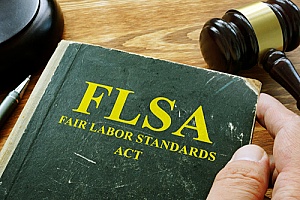 The Fair Labor Standards Act (FLSA) is a 1938 federal law overseen by the Department of Labor that establishes minimum wage, overtime pay and hours, recordkeeping and child employment provisions. Employees generally fall into two categories regarding overtime pay: FLSA exempt and non-exempt. FLSA exempt workers are not eligible for compensation corresponding to any hours over 40 worked in a week, while non-exempt employees do qualify for overtime pay. The FLSA also states that employers are not required to pay overtime if an employee works more than eight hours in a day or on a holiday as long as the total hours for that given week do not exceed 40.
The Fair Labor Standards Act (FLSA) is a 1938 federal law overseen by the Department of Labor that establishes minimum wage, overtime pay and hours, recordkeeping and child employment provisions. Employees generally fall into two categories regarding overtime pay: FLSA exempt and non-exempt. FLSA exempt workers are not eligible for compensation corresponding to any hours over 40 worked in a week, while non-exempt employees do qualify for overtime pay. The FLSA also states that employers are not required to pay overtime if an employee works more than eight hours in a day or on a holiday as long as the total hours for that given week do not exceed 40.
It is important to distinguish between these two types of employees and why they are classified as such. If you are unsure whether or not you are categorized as FLSA exempt or non-exempt, here is what you need to know.
FLSA Exempt vs. Non-Exempt Employees
The biggest distinction between these two types of workers concerns eligibility for overtime pay. The FLSA dictates that all workers must be paid at least the federal minimum wage ($7.25/hr in 2019) for a maximum of 40 hours in a workweek. In the case of non-exempt employees, the law requires these workers to be paid at 1.5 times their regular rate for each hour over 40 worked in a workweek. Therefore, an employee earning $15/hr would earn $22.5/hr for each hour of overtime. FLSA-exempt workers are not entitled to this pay rate for overtime. Most states also often have their own wage and hourly rate laws that outline additional requirements.
Since exempt employees are not eligible for overtime pay, they are always salaried workers, whereas non-exempt employees could be paid either on an hourly or salary basis. Exempt workers are thus more likely to receive benefits like health insurance, paid time off and retirement plans. According to a 2018 report from The Balance, there are two other major differences between these two types of workers. Non-exempt employees can earn any amount each week, while exempt workers by definition earn at least $455 per week ($23,660 per year). Also, non-exempt employees can work in any field or industry, whereas exempt employees must fit into one of eight categories:
- Administrative – office or non-manual work directly related to the management of employer’s customers and general business operations.
- Professional- advanced work in a specialized field of knowledge, usually scientific or technical like computer analytics or teaching.
- Executive – work tied to an upper-level management position in a company or department of said organization; directing/supervising work of at least two employees and have the authority to fire or hire workers.
- Sales
- Science
- Technology
- Engineering
- Math
How to Determine If You Are FLSA Exempt or Non-Exempt
 Employees can determine whether they are exempt by using ‘the exemption test.’ This examination, also called a ‘duties test,’ essentially evaluates workers’ daily responsibilities within their organization in order to assess whether or not they are eligible for overtime pay.
Employees can determine whether they are exempt by using ‘the exemption test.’ This examination, also called a ‘duties test,’ essentially evaluates workers’ daily responsibilities within their organization in order to assess whether or not they are eligible for overtime pay.
If you find out you are non-exempt, you are entitled to time-and-a-half pay for any hours worked over 40 in a week. You should also be aware that effective January 1, 2020, the rules dictating overtime pay for non-exempt employees will change:
- The minimum salary amount for these workers will increase from $455 per week to $684 per week ($35,568 annually).
- For “highly-compensated” workers, the yearly compensation requirement will be raised from $100,000 annually to $107,432 per year.
- Employers will be allowed to utilize nondiscretionary bonuses and incentive payments like commissions paid at least yearly to reach up to 10% of the standard salary amount.
You should also learn about your state’s guidelines for exempt employees and minimum overtime pay for non-exempt workers. In California, the minimum wage is $12 per hour, which means non-exempt employees must be paid at least $18.50 per hour (1.5 x 12) for each hour of overtime pay, although this only applies to employers with more than 26 employees.
Seeking More Information About FLSA Exemption Status and Overtime Pay
Speak to the experienced attorneys at The Brown Firm in Alexandria, Virginia to learn more about the differences between FLSA-exempt and non-exempt employees or if you are classified as non-exempt and are considering suing your employer for unpaid overtime.
If you work in Virginia or the D.C. area, The Brown Firm’s professionals can assist you with wage and hour disputes via a legal consultation. Their attorneys will advise you on which options are available to you, so be sure to contact them online or by phone. The Brown Firm’s lawyers boast experience in civil litigation, employment law and even know how to handle cases related to tipping. The Brown Firm boasts more than 65 years of experience in legal practices.

